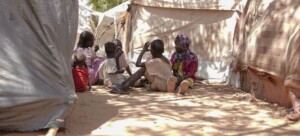Sudan to combat fast spreading viral fevers in the country
The Sudanese Health Ministry announced a plan to contain the spread of vector-borne diseases in seven states in eastern and western Sudan. In North Darfur, 12 cases of acute haemorrhagic fever and more than 49,000 new cases of malaria were recorded during the past four weeks.
 Kassala, Red Sea state in eastern Sudan, and Darfur in western Sudan (RD Archive)
Kassala, Red Sea state in eastern Sudan, and Darfur in western Sudan (RD Archive)
The Sudanese Health Ministry announced a plan to contain the spread of vector-borne diseases in seven states in eastern and western Sudan. In North Darfur, 12 cases of acute haemorrhagic fever and more than 49,000 new cases of malaria were recorded during the past four weeks.
According to reports from the Sudanese Ministry of Health, 135 people are suffering from dengue fever in Kassala, Red Sea state, and North Darfur.
The Health Ministry has developed a vector-control plan for Kassala, Red Sea state, and the five states of Darfur, at a cost of SDG 49 million ($ 1.088.888*). The Ministry reserved SDG 2.5 million to start the campaign in Kassala, launched on Sunday.
On Monday, the hashtags Kassala_is_dying, Save_Kassala, and appeared again on social media platforms, to draw attention to the seriousness of the situation in the state, especially in the capital. The tweeters pointed to a possible return of chikungunya fever**, that plagued eastern Sudan in 2018, and in February and July this year, and urged the international community to intervene to contain the disease.
The number of viral fevers recorded in the Red Sea and Nile River states amount to 75 cases. The Ministry of Health reported on Sunday that Rift Valley fever is spreading in River Nile state.
North Darfur
The North Darfur Ministry of Health recorded 12 cases of “acute haemorrhagic fever” in the past four weeks. One of them died in El Fasher Teaching Hospital on Thursday, Doctor Suleiman Idris, Director-General of the state Health Ministry, said in a press statement on Monday.
He reported 49,141 new cases of malaria in the past four weeks, of which 12,276 cases were recorded last week.
The medic described the outbreak of the diseases as “unprecedented”.
He said an isolation ward at the El Fasher Teaching Hospital has been reserved for patients suspected to be suffering from contagious diseases. A tent has been set-up in front of the hospital gate, to receive the patients who will get free treatment.
Earlier this month, Idris reported that ten residents of El Fasher, capital of North Darfur, died because of Dengue fever, haemorrhagic fever, chikungunya fever and fever caused by malaria.
Vector-borne diseases usually afflict several regions in Sudan after heavy rainfall and flooding during the rainy season that lasts from May/June to September/October. In end 2012, Darfur was stricken by a yellow fever epidemic.
* As effective foreign exchange rates can vary in Sudan, Radio Dabanga bases all SDG currency conversions on the daily US Dollar rate quoted by the Central Bank of Sudan (CBoS)
** Chikungunya fever is spread by the Aedes aegypti mosquito, the same kind that spreads dengue and Zika virus. It is characterised by an abrupt onset of fever, frequently accompanied by joint pain. Chikungunya shares some clinical signs with dengue and can be misdiagnosed in areas where dengue is common. In areas where chikungunya and dengue viruses cocirculate, they can be transmitted together. There is no specific treatment for chikungunya. Most patients recover fully within weeks, but in some cases joint pain may persist for several months, or even years. With older people, the disease can contribute to the cause of death. Stagnant water and poor sanitation are blamed for the spread of the mosquitoes.
Viral haemorrhagic fevers are a group of illnesses caused by four families of viruses. These include the Ebola and Marburg, Lassa fever, and yellow fever viruses. These fevers affect the body's ability to regulate itself.
Our editorial independence means that we can continue to provide factual updates about political developments to Sudanese and international actors, educate people about how to avoid outbreaks of infectious diseases, and provide a window to the world for those in all corners of Sudan. Support Radio Dabanga for as little as €2.50, the equivalent of a cup of coffee.












 and then
and then